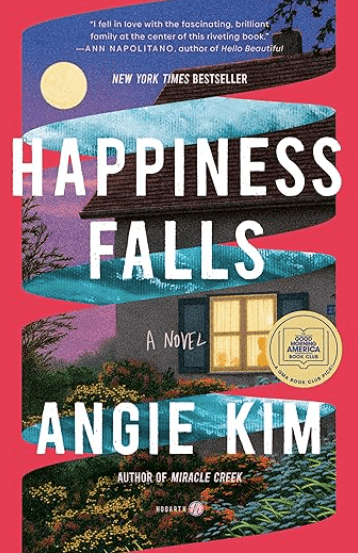
By Angie Kim
Published by Hogarth (August 29, 2023), Hardback – $30, 400 pages
Hardback edition
Kindle edition
Reviewed by Ashley Riggleson
There are few thrillers I have thought more about over the years than Angie Kim’s debut novel, Miracle Creek. So, I was so excited to see that her newest novel, Happiness Falls was available for review. I jumped at the chance, and I was not disappointed. This compelling and twisty family drama gives much food for thought, and Angie Kim is in top form.
Happiness Falls tells the story of a biracial Korean American family whose lives are turned upside down when the patriarch goes missing. The action begins when the youngest son, Eugene, returns from the park agitated and without his father, Adam, in tow. Thinking that their father has simply been delayed, the family waits to call the police, a decision they will all come to regret. After several hours pass, they finally reach out to detectives.
Told from the perspective of Eugene’s older sister, Mia, it originally seems that Happiness Falls tells the story of an ordinary family. As Kim peels back the layers in this story, however, it becomes apparent that things are more complicated than Mia would initially have readers believe.
To begin with, readers quickly learn that Eugene is a disabled, nonspeaking child. He is on the Autism spectrum and has a disorder called Angelman Syndrome. This combination of disorders means that, though Eugene always appears to be happy, he is unable to express what is truly going on inside. And so, he is initially unable to tell either his family or detectives what happened to his father, even though, presumably, he witnessed the events. So, they must rely on whatever clues they can find outside of Eugene’s perspective.
As the investigation continues, the police and the family discover several things about Adam that they were unaware of before; not all of them good. Although Adam himself is not found in the park, police find some of his things—an empty wallet, a backpack, and a waterlogged notebook. While Adam’s disappearance is at the center of this narrative, this book does not feel like his story. Instead, Kim tells a story about what happens to a family when their father/husband disappears in the early days of the pandemic.
Before picking up Happiness Falls, readers should know that, though Kim’s novel has many of the elements of a thriller, the pacing is not as fast as the synopsis above suggests. Instead, it is a slow burn, and this choice could put many readers off at first. I love a faced-paced thriller with lots of twists, but I also loved this slower take on the genre in which we get a deep dive into this ultimately loving but deeply flawed family.
Like many Asian-American writers, Kim uses this text to explore Mia’s identity as an Asian-American woman who feels that she exists in a liminal space—neither fully Korean, nor fully American. Readers know from the story itself but also from Kim’s skillful use of footnotes that this identity informs Mia’s thinking on a variety of topics and events.
I would argue, however, that this story is more concerned with Eugene’s identity as a disabled teenager. Kim explores, for instance, the difference between nonverbal and nonspeaking, and the question of how much Eugene understands about what is happening around him informs much of the novel’s plot. Because, sadly, even Eugene’s own family fails to comprehend that, although Eugene is disabled, he is not absent from the world.
Many of the conflicts in the narrative arise because of his family’s ableism and the ableism of society at-large. As the novel progressed, I felt saddened, enraged, and astounded by the enormity of the injustice that has been done to Eugene, an issue Mia herself explores at length. Of course, Kim also deftly explores many other themes, but it is this tender and bruised discussion about disability that I will remember most.
I loved Miracle Creek, but although that novel also explores disability, Kim expands on those themes in a way that I did not know I needed.
As a disabled person, I am often skeptical of novels that center disabled experiences when the author is not (to my knowledge) disabled themselves. But Angie Kim is one of the few writers that I would say is up to the challenge.
This profoundly unsettling but poignant novel is sure to start conversations and linger in readers’ minds well after the final page is turned.





